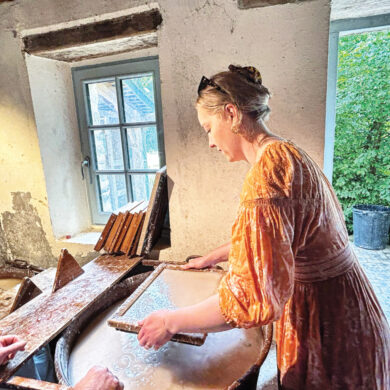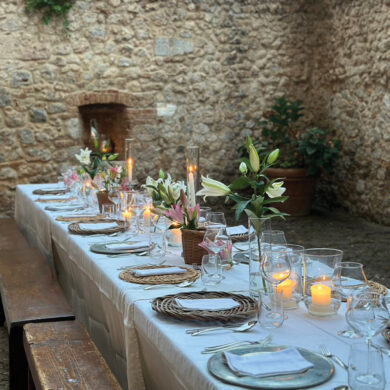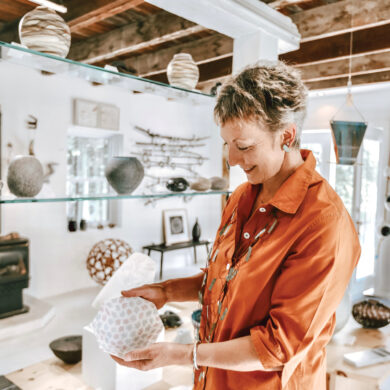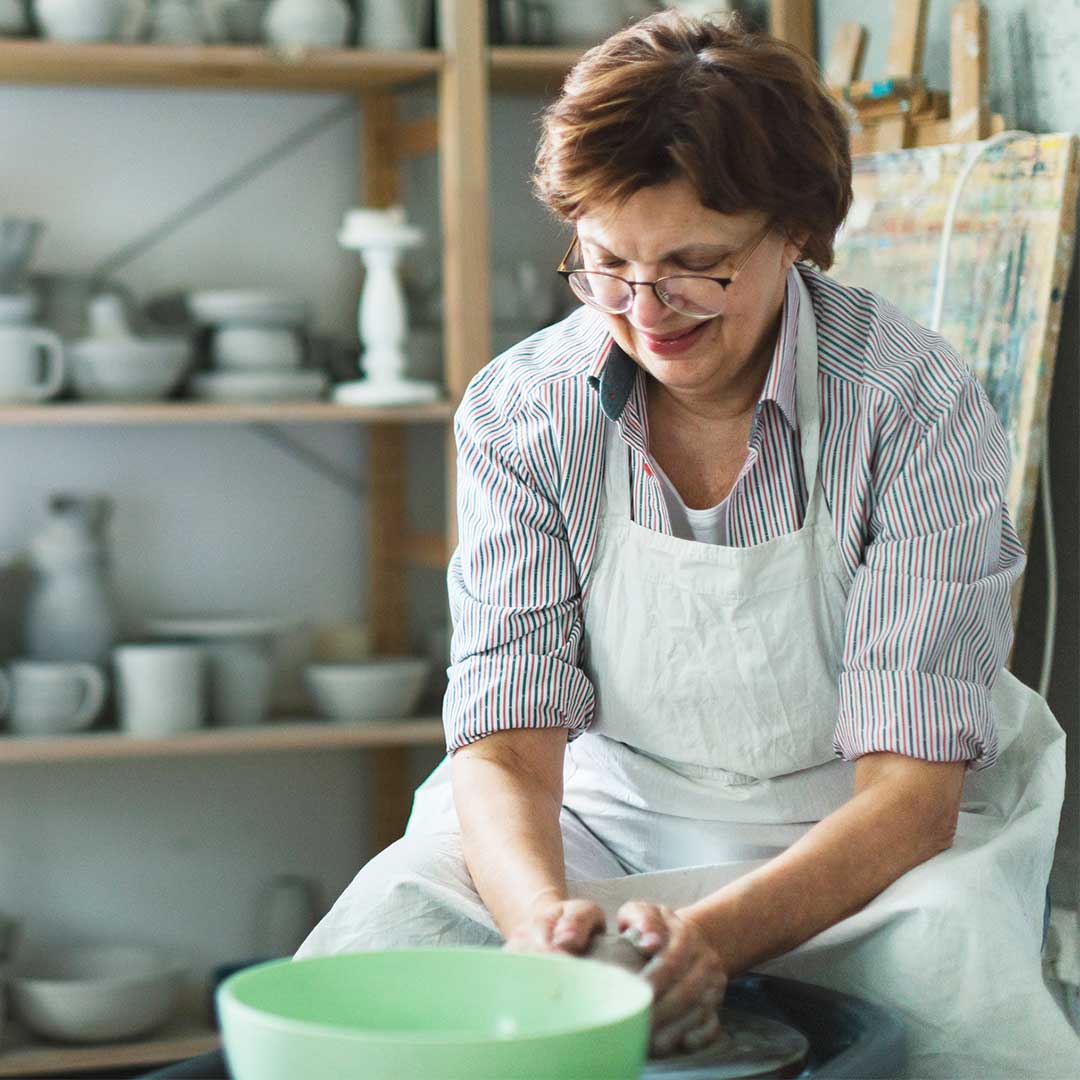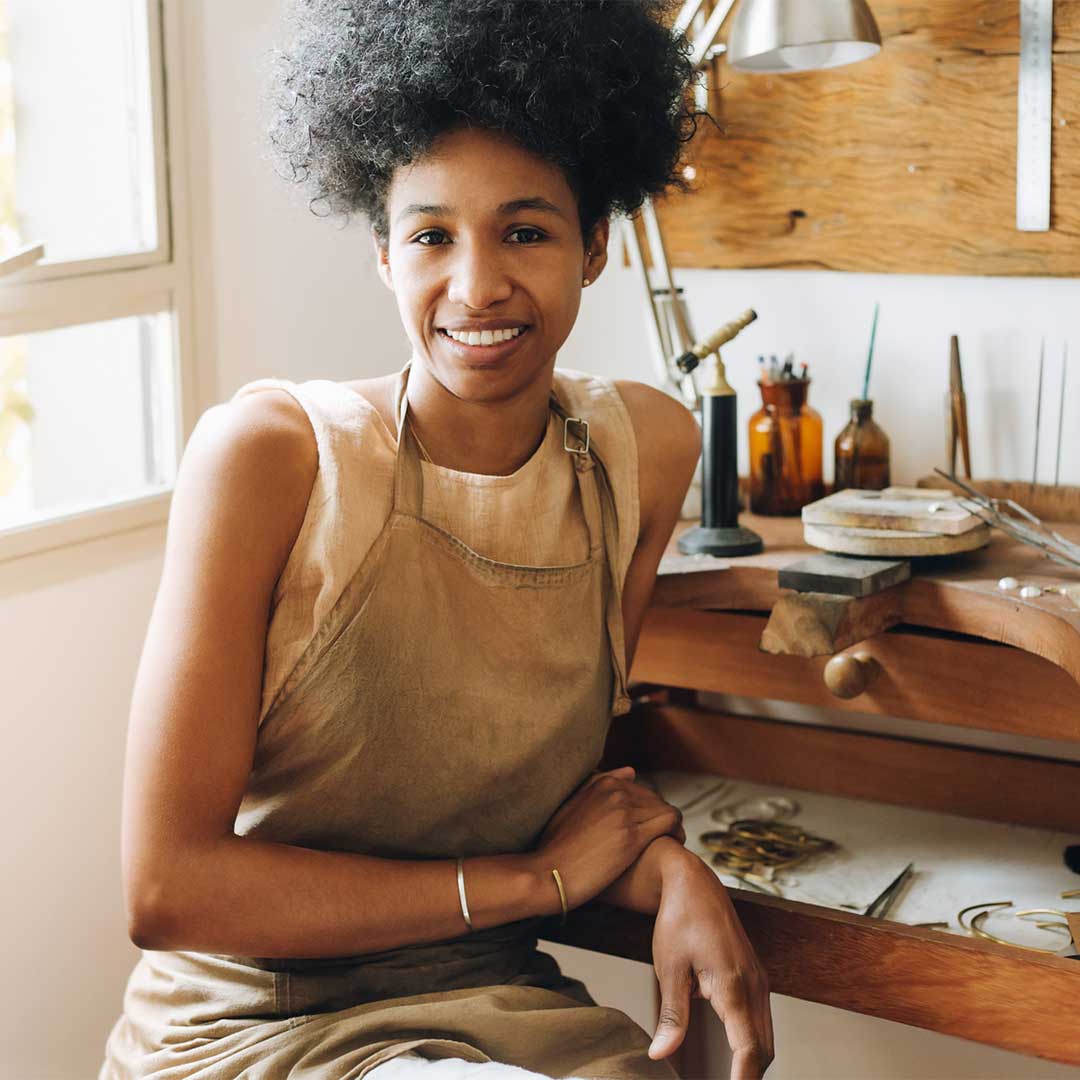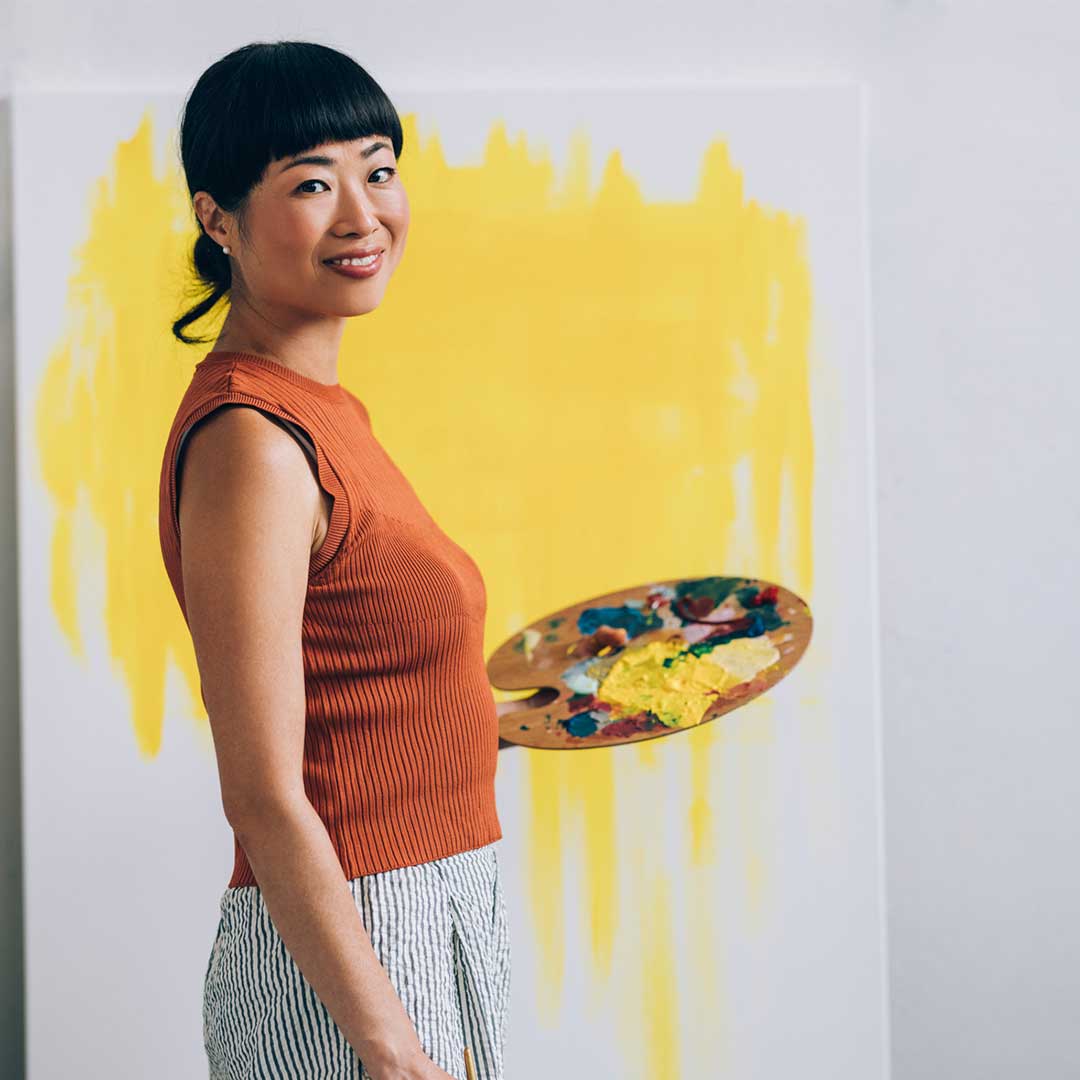
MillHouse is a sisterhood of two nonprofit organizations led by my sister, photographer and artist Aimee Woolverton, my soul sister, artist and jeweler Dana Brock, and me. Who am I? I’m a Texas-born boot-strapper, a nonlinear disruptive thinker, a creative storyteller and explorer, and a social scientist with expertise in citizen engagement, collaborative practice and innovative program design. I’m an unrelenting, unreasonable, unapologetic believer in the impossible. I retired from NASA after 33 years in federal service, primarily in Washington, D.C., and moved back to Texas, where the MillHouse story begins.

Not long after moving to McKinney, I met Terry Casey, the owner of the Cotton Mill. Through a series of events working with Terry and city leaders, I recognized a gap in the marketplace for women entrepreneurs in creative fields. MillHouse was born.
My co-founders, Dana and Aimee, and I are in our sixth year of business at the Cotton Mill with two nonprofits. MillHouse Foundation hosts our festivals; and membership-based MillHouse McKinney operates our collaboration space for creative women. Both ventures exist to enhance earning potential for micro-business women by providing opportunities for them to showcase and sell their work, refine and share their expertise, and connect and collaborate with other creative women.

We’re in the business of growing dreams, which translates into economic development. Though overlooked and often discounted, small and micro businesses are the bedrock of our economy. Creative businesswomen, who are most often sole proprietors, fall in this category. We believe as women rise, so do our families and communities.
The multiplier effect is evident with increased purchase power at the local grocery store, gas station and retail shops, and for entertainment and real estate. These benefits may appear as ripples rather than tidal waves — a macro-level blip — but the community is enhanced nonetheless, both economically and culturally. At MillHouse, we offer women hope for a prosperous future where they flourish emotionally, creatively, and economically.

The journey over the last six years has been hard-fought and full of tears and triumphs. As we encountered setbacks, as any startup will, we rethought, revamped and redesigned our business model. And we had fun throughout the process. After all, “Creativity is intelligence having fun,” according to Albert Einstein.
Thankfully, the Cotton Mill Partners — Terry Casey and his sons McCall and Chandler — believed in our vision. They not only built out our space for us but allowed us to host festivals and markets in their facility. And, against all odds, our idea worked. We feel blessed to operate out of the gorgeous century-old Cotton Mill and contribute to its storied history.

The fact that we’re still in business today, after a global pandemic, economic downturn and crazy inflation, is a miracle. We’ve grown from a modest 1,500-square-feet space with four artist studios to a 14,000-square-feet facility with two artist suites and classroom space, a photography suite with a conference room and two shared photography studios equipped with backdrops, lighting and props, and a collaboration suite with living room spaces and a coffee/wine bar. We have 32 individual studios, including two 1,000-square-feet gallery studios. Our growth is proof we’re filling a marketplace gap, just as we envisioned.
From my perspective, MillHouse is much like a perennial garden where creative small businesswomen bloom, grow and flourish. We see seasonal shifts and adjustments as members come and go; instructors stretch and change what they offer; and participation reflects the weather patterns. Some of our members have been with us since the beginning. They’re family. Others find us as they move into the region or decide to pursue their passion projects. Some women plug in as co-workers, then take the next step by taking a studio space.
We offer opportunities to take baby steps at each stage of their journey. What an incredible milestone when a member’s business advances to the point they outgrow us.

Women create and innovate differently than men. Not better or worse. We’re simply not the same in the way we see and think. Innovation, to us, has roots in family, friends or community. Our lives are chronically over-committed. We innovate to expedite and simplify our daily routines, or prettify them.
Men innovate for the cool factor: shinier, faster, slicker products. Men tend to innovate around a few ideas, select the dominant one, then move forward, generally in a linear fashion.
Women tend to be nonlinear multiprocessors. We leap-frog easily from topic to topic, crisis to crisis, idea to idea. We create better in a collaborative setting where we can safely express ourselves and share ideas. In conversations with other women, we elevate ideas, adding texture and context, as ideas rub against, and bounce off, each other. We tend to generate more ideas than we can possibly process and have trouble narrowing down the one great idea to pursue. We can become overwhelmed and burdened by all the available options. At this point, we may shut down. In the meantime, men make steady progress on their one dominant idea.

In mentoring creative women at MillHouse, I encourage them to write down ALL their ideas. This simple exercise of downloading our brain frees us from our mind’s clutter — like clearing the desktop or cleaning out a closet. With a fresh perspective, one idea always pops out — the dominant idea.
The next step is to craft that idea into a business concept, put it into practice, build your reputation, then decide if you want to add layers of complexity. All those other ideas on the waiting list may never see the light of day. And that’s OK. We’re focused on pursuing our passion, finally.

As women advance into the startup phase, we inevitably face the stress-panic caused by the dreaded bottom line. Owning a business means paying the bills, whether or not we get paid. We’re not only building our business, but also credibility and reputation with clients, vendors and property owners.
My advice: No matter how much it hurts, pay your bills and honor your product orders with clients — on time, no excuses! Business is all about relationships and customer experience. If you’re not reliable, word spreads. Your business will feel the ill effects.

A unique challenge we face as a women-owned business designed for creative women in business is best expressed by the Mad Hatter in Lewis Carroll’s Through the Looking Glass, when he said to Alice, “You used to be much more … muchier. You’ve lost your muchness.” Many women who walk into MillHouse have lost their muchness. They once had dreams and self-esteem, before life beat them down.
At MillHouse, we’re in the business of building muchness. We design our series of speakers, workshops and classes around women’s interests and/or struggles, and provide inspirational opportunities for them to uncover or rediscover discarded hopes and aspirations.
We help women believe in themselves and their innate value and provide opportunities to explore and refine creative abilities of all types. Our members pursue their individual business goals while helping one another by sharing insights, tips of the trade and offering expertise and instruction. Our community is amazingly generous, caring and uplifting.
We endeavor to rise up from muchlessness and strive for the attitude of the Queen when she says to Alice, “Why, sometimes I’ve believed as many as six impossible things before breakfast.”
Impossible is the best goal to strive for, in my opinion. So many are content with what is possible, but anyone can be ordinary. Chasing the extraordinary takes passion, persistence and internal fortitude. Every innovation once looked impossible until someone, somewhere, at some time, proved otherwise.

Sadly, we can defeat ourselves before we ever try. We dismiss our own potential and sabotage our dreams for fear of failure. Yet, each of us is capable of extraordinarily impossible things — if we’re willing to suspend our own disbelief.
Collectors, clients and first-time visitors come to MillHouse for art, products and services, speakers, workshops, festivals and events. We invite you to come by the Cotton Mill for a tour, no matter where you live.

McKinney is an adorable place to visit, with an historic town square for shopping and eating; great places to stay in the historic district; and festivals galore — including monthly events hosted by MillHouse. We host two indoor fine art festivals every February and August, an outdoor mural festival in June, and artisan markets on second Saturdays.
If you haven’t visited Texas, it’s time. If you’re considering a move, McKinney is the best place to live, work and play. For women in the North Texas area, we’d love for you to join our creative community.

MillHouse is a sisterhood of two nonprofit organizations led by my sister, photographer and artist Aimee Woolverton, my soul sister, artist and jeweler Dana Brock, and me. Who am I? I’m a Texas-born boot-strapper, a nonlinear disruptive thinker, a creative storyteller and explorer, and a social scientist with expertise in citizen engagement, collaborative practice and innovative program design. I’m an unrelenting, unreasonable, unapologetic believer in the impossible. I retired from NASA after 33 years in federal service, primarily in Washington, D.C., and moved back to Texas, where the MillHouse story begins.

Not long after moving to McKinney, I met Terry Casey, the owner of the Cotton Mill. Through a series of events working with Terry and city leaders, I recognized a gap in the marketplace for women entrepreneurs in creative fields. MillHouse was born.
My co-founders, Dana and Aimee, and I are in our sixth year of business at the Cotton Mill with two nonprofits. MillHouse Foundation hosts our festivals; and membership-based MillHouse McKinney operates our collaboration space for creative women. Both ventures exist to enhance earning potential for micro-business women by providing opportunities for them to showcase and sell their work, refine and share their expertise, and connect and collaborate with other creative women.

We’re in the business of growing dreams, which translates into economic development. Though overlooked and often discounted, small and micro businesses are the bedrock of our economy. Creative businesswomen, who are most often sole proprietors, fall in this category. We believe as women rise, so do our families and communities.
The multiplier effect is evident with increased purchase power at the local grocery store, gas station and retail shops, and for entertainment and real estate. These benefits may appear as ripples rather than tidal waves — a macro-level blip — but the community is enhanced nonetheless, both economically and culturally. At MillHouse, we offer women hope for a prosperous future where they flourish emotionally, creatively, and economically.

The journey over the last six years has been hard-fought and full of tears and triumphs. As we encountered setbacks, as any startup will, we rethought, revamped and redesigned our business model. And we had fun throughout the process. After all, “Creativity is intelligence having fun,” according to Albert Einstein.
Thankfully, the Cotton Mill Partners — Terry Casey and his sons McCall and Chandler — believed in our vision. They not only built out our space for us but allowed us to host festivals and markets in their facility. And, against all odds, our idea worked. We feel blessed to operate out of the gorgeous century-old Cotton Mill and contribute to its storied history.

The fact that we’re still in business today, after a global pandemic, economic downturn and crazy inflation, is a miracle. We’ve grown from a modest 1,500-square-feet space with four artist studios to a 14,000-square-feet facility with two artist suites and classroom space, a photography suite with a conference room and two shared photography studios equipped with backdrops, lighting and props, and a collaboration suite with living room spaces and a coffee/wine bar. We have 32 individual studios, including two 1,000-square-feet gallery studios. Our growth is proof we’re filling a marketplace gap, just as we envisioned.
From my perspective, MillHouse is much like a perennial garden where creative small businesswomen bloom, grow and flourish. We see seasonal shifts and adjustments as members come and go; instructors stretch and change what they offer; and participation reflects the weather patterns. Some of our members have been with us since the beginning. They’re family. Others find us as they move into the region or decide to pursue their passion projects. Some women plug in as co-workers, then take the next step by taking a studio space.
We offer opportunities to take baby steps at each stage of their journey. What an incredible milestone when a member’s business advances to the point they outgrow us.

Women create and innovate differently than men. Not better or worse. We’re simply not the same in the way we see and think. Innovation, to us, has roots in family, friends or community. Our lives are chronically over-committed. We innovate to expedite and simplify our daily routines, or prettify them.
Men innovate for the cool factor: shinier, faster, slicker products. Men tend to innovate around a few ideas, select the dominant one, then move forward, generally in a linear fashion.
Women tend to be nonlinear multiprocessors. We leap-frog easily from topic to topic, crisis to crisis, idea to idea. We create better in a collaborative setting where we can safely express ourselves and share ideas. In conversations with other women, we elevate ideas, adding texture and context, as ideas rub against, and bounce off, each other. We tend to generate more ideas than we can possibly process and have trouble narrowing down the one great idea to pursue. We can become overwhelmed and burdened by all the available options. At this point, we may shut down. In the meantime, men make steady progress on their one dominant idea.

In mentoring creative women at MillHouse, I encourage them to write down ALL their ideas. This simple exercise of downloading our brain frees us from our mind’s clutter — like clearing the desktop or cleaning out a closet. With a fresh perspective, one idea always pops out — the dominant idea.
The next step is to craft that idea into a business concept, put it into practice, build your reputation, then decide if you want to add layers of complexity. All those other ideas on the waiting list may never see the light of day. And that’s OK. We’re focused on pursuing our passion, finally.

As women advance into the startup phase, we inevitably face the stress-panic caused by the dreaded bottom line. Owning a business means paying the bills, whether or not we get paid. We’re not only building our business, but also credibility and reputation with clients, vendors and property owners.
My advice: No matter how much it hurts, pay your bills and honor your product orders with clients — on time, no excuses! Business is all about relationships and customer experience. If you’re not reliable, word spreads. Your business will feel the ill effects.

A unique challenge we face as a women-owned business designed for creative women in business is best expressed by the Mad Hatter in Lewis Carroll’s Through the Looking Glass, when he said to Alice, “You used to be much more … muchier. You’ve lost your muchness.” Many women who walk into MillHouse have lost their muchness. They once had dreams and self-esteem, before life beat them down.
At MillHouse, we’re in the business of building muchness. We design our series of speakers, workshops and classes around women’s interests and/or struggles, and provide inspirational opportunities for them to uncover or rediscover discarded hopes and aspirations.
We help women believe in themselves and their innate value and provide opportunities to explore and refine creative abilities of all types. Our members pursue their individual business goals while helping one another by sharing insights, tips of the trade and offering expertise and instruction. Our community is amazingly generous, caring and uplifting.
We endeavor to rise up from muchlessness and strive for the attitude of the Queen when she says to Alice, “Why, sometimes I’ve believed as many as six impossible things before breakfast.”
Impossible is the best goal to strive for, in my opinion. So many are content with what is possible, but anyone can be ordinary. Chasing the extraordinary takes passion, persistence and internal fortitude. Every innovation once looked impossible until someone, somewhere, at some time, proved otherwise.

Sadly, we can defeat ourselves before we ever try. We dismiss our own potential and sabotage our dreams for fear of failure. Yet, each of us is capable of extraordinarily impossible things — if we’re willing to suspend our own disbelief.
Collectors, clients and first-time visitors come to MillHouse for art, products and services, speakers, workshops, festivals and events. We invite you to come by the Cotton Mill for a tour, no matter where you live.

McKinney is an adorable place to visit, with an historic town square for shopping and eating; great places to stay in the historic district; and festivals galore — including monthly events hosted by MillHouse. We host two indoor fine art festivals every February and August, an outdoor mural festival in June, and artisan markets on second Saturdays.
If you haven’t visited Texas, it’s time. If you’re considering a move, McKinney is the best place to live, work and play. For women in the North Texas area, we’d love for you to join our creative community.




















